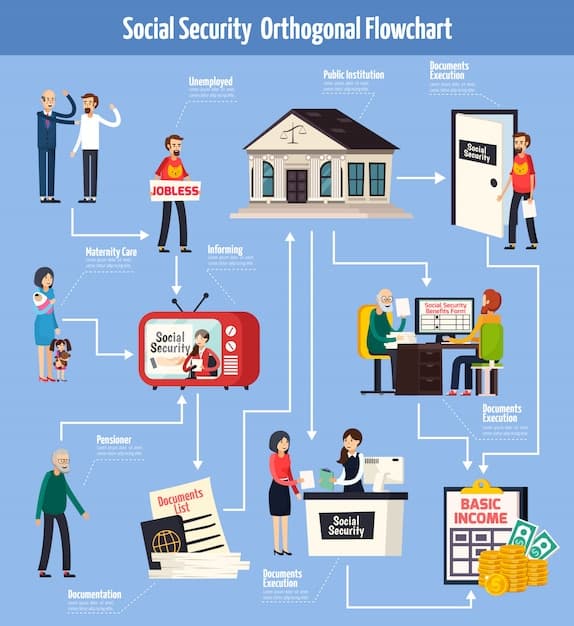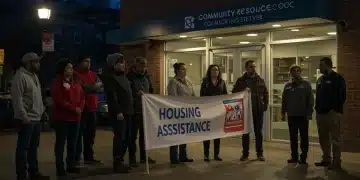Rental Assistance for Seniors in the US: A Comprehensive Guide

Rental assistance programs for seniors in the US provide crucial support to older adults with limited income, helping them afford safe and stable housing.
Navigating the world of rental assistance programs for seniors in the US can seem daunting, but understanding your options is the first step toward securing affordable housing. This guide will help you explore available resources and maximize your benefits.
Understanding Rental Assistance Programs for Seniors
Affordable housing is a critical need for many seniors, especially those on fixed incomes. Rental assistance programs aim to bridge the gap between income and housing costs, ensuring that older adults have access to safe and stable living environments. These programs can significantly improve the quality of life for seniors, offering peace of mind and financial stability.
Why Rental Assistance is Important for Seniors
As people age, their income often decreases while healthcare and other expenses rise. Rental assistance can alleviate the financial burden of housing, allowing seniors to allocate their limited resources to other essential needs.
Types of Rental Assistance Programs
Several types of rental assistance programs exist, each with its own eligibility requirements and application process. Understanding the different options available can help seniors identify the programs that best fit their circumstances.
- Public Housing: Government-owned housing units offered at reduced rents to low-income individuals and families, including seniors.
- Section 8 Housing Choice Voucher Program: A federal program that provides rental subsidies to eligible tenants, allowing them to choose housing in the private market.
- State and Local Programs: Many states and local governments offer their own rental assistance programs tailored to the specific needs of their communities.
By exploring these various options, seniors can find the support they need to maintain stable and affordable housing.

Navigating the Section 8 Housing Choice Voucher Program
The Section 8 Housing Choice Voucher Program is a key resource for seniors seeking rental assistance. This federal program enables eligible tenants to find housing in the private market and receive rental subsidies. Understanding the eligibility requirements and application process is essential for seniors looking to benefit from this program.
Eligibility Requirements for Section 8
To qualify for Section 8, seniors must meet certain income and asset requirements. Generally, eligibility is based on household income relative to the area median income.
How to Apply for Section 8
The application process for Section 8 involves contacting the local Public Housing Agency (PHA). Be prepared to provide documentation of income, assets, and other relevant information.
Finding Housing with a Section 8 Voucher
Once approved for a Section 8 voucher, seniors can begin searching for housing in the private market. It’s important to find landlords who accept Section 8 vouchers and to ensure that the housing meets program standards.
- Contact the Local PHA: They can provide lists of participating landlords and assistance with finding suitable housing.
- Search Online Housing Portals: Many websites list apartments that accept Section 8 vouchers.
- Attend Housing Fairs: These events can connect seniors with landlords and housing resources.
Successfully navigating the Section 8 program can provide seniors with a stable and affordable housing option.
Exploring Public Housing Options for Seniors
Public housing is another important resource for seniors seeking affordable rental options. These government-owned housing units are offered at reduced rents to eligible low-income individuals and families. Public housing can provide a safe and stable living environment for seniors with limited financial resources.
How Public Housing Works
Public housing is managed by local housing authorities. These authorities are responsible for setting eligibility requirements, managing applications, and maintaining the housing units.
Benefits of Public Housing for Seniors
Public housing often includes amenities and services specifically tailored to the needs of seniors, such as accessible units and community activities. These features can enhance the quality of life for older residents.
Finding Public Housing Near You
To find public housing options in your area, contact your local housing authority. They can provide information on available units and the application process.
Consider these steps to improve your chances of securing public housing:
- Contact the Local Housing Authority: Obtain information on eligibility requirements and application procedures.
- Visit Different Public Housing Communities: Assess which communities best meet your needs and preferences.
- Submit a Complete and Accurate Application: Ensure all required documentation is included to avoid delays.
Finding suitable public housing can significantly improve housing stability for seniors.
State and Local Rental Assistance Programs
In addition to federal programs like Section 8 and public housing, many state and local governments offer their own rental assistance initiatives tailored to the unique needs of their communities. These programs can provide additional support for seniors seeking affordable housing.
Variations in State Programs
State rental assistance programs vary widely in terms of eligibility requirements, benefit levels, and application procedures. It’s important to research the specific programs available in your state.
Local Initiatives for Seniors
Local governments often partner with nonprofit organizations to provide rental assistance and supportive services for seniors. These initiatives may include emergency rental assistance, housing counseling, and eviction prevention programs.
How to Find State and Local Programs
To find state and local rental assistance programs, contact your state housing agency or local government. They can provide information on available resources and eligibility requirements.

To maximize your chances of finding suitable state and local rental assistance:
- Contact Your State Housing Agency: Obtain detailed information on state-sponsored rental assistance programs.
- Reach Out to Local Government Offices: Inquire about city and county-level rental assistance initiatives.
- Connect with Nonprofit Organizations: Many nonprofits offer rental assistance and housing support services for seniors.
Exploring state and local programs can uncover additional avenues for rental assistance, supplementing federal support and catering to specific local needs.
Maximizing Your Benefits: Tips and Strategies
Successfully accessing and maximizing rental assistance benefits requires careful planning and proactive steps. By understanding the application processes, staying informed about available resources, and advocating for your needs, seniors can increase their chances of securing affordable housing.
Understanding Application Processes
Each rental assistance program has its own application process, and it’s important to understand the specific requirements of each program. Be prepared to provide documentation of income, assets, and other relevant information.
Staying Informed About Available Resources
Rental assistance programs and resources are constantly evolving, so it’s important to stay informed about the latest updates. Sign up for newsletters, attend community meetings, and connect with local housing advocates to stay in the know.
Advocating for Your Needs
Navigating the rental assistance system can be challenging, so don’t be afraid to advocate for your needs. If you encounter obstacles or have questions, seek assistance from housing counselors, legal aid organizations, or other advocates.
Follow these strategies to maximize the benefits you receive:
- Submit Complete Applications: Ensure all required documentation is included to avoid delays and potential rejections.
- Track Application Status: Regularly check on the status of your application and promptly respond to any requests for additional information.
- Explore All Available Programs: Investigate federal, state, and local rental assistance initiatives to identify all potential sources of support.
Proactive engagement and thorough preparation can significantly enhance your access to valuable rental assistance benefits.
Overcoming Common Challenges in Accessing Rental Assistance
While rental assistance programs are a valuable resource, accessing these benefits can present significant challenges. Long waiting lists, complex application processes, and limited housing availability are common obstacles that seniors may face. By understanding these challenges and developing effective strategies to overcome them, seniors can improve their chances of securing affordable housing.
Long Waiting Lists
Many rental assistance programs have long waiting lists, which can be a significant barrier for seniors who need immediate housing assistance. To address this challenge, apply to multiple programs and explore temporary housing options while waiting for assistance.
Complex Application Processes
The application processes for rental assistance programs can be complex and confusing, especially for seniors who are unfamiliar with government bureaucracy. Seek assistance from housing counselors or legal aid organizations to navigate the application process.
Limited Housing Availability
The availability of affordable housing is a major challenge in many communities. To increase your chances of finding housing, expand your search area and consider smaller or less desirable units.
Here are key actions to take when facing challenges:
- Seek Professional Guidance: Consult with housing counselors or social workers who can provide personalized support and navigate complex systems.
- Prepare Thoroughly: Gather all necessary documentation and information before starting the application process to avoid delays.
- Be Persistent: Stay proactive and follow up regularly on your applications.
Addressing these challenges with determination and resourcefulness will enhance your chances of securing rental assistance and stable housing.
| Key Point | Brief Description |
|---|---|
| 🏠 Section 8 | Federal program offering rental vouchers for private market housing. |
| 🏢 Public Housing | Government-owned housing at reduced rents for low-income individuals. |
| 📍 State/Local Programs | Additional rental assistance initiatives tailored to specific communities. |
| ✅ Maximizing Benefits | Submit complete applications and stay informed about available resources. |
Frequently Asked Questions (FAQ)
The Section 8 Housing Choice Voucher Program is a federal initiative that helps low-income families, including seniors, afford housing in the private market by providing rental assistance vouchers.
To apply for public housing, contact your local Public Housing Agency (PHA) and complete an application. You’ll need to provide documentation of your income and assets.
While many rental assistance programs are open to people of all ages, some state and local initiatives may prioritize seniors or offer benefits tailored to their needs.
While on a waiting list, explore other housing options, such as temporary housing or shared living arrangements. You should also regularly check on the status of your application.
You can seek assistance from housing counselors, social workers, legal aid organizations, or senior service agencies who can guide you through the rental assistance application process.
Conclusion
Securing affordable housing is vital for seniors’ well-being and independence. By understanding the various rental assistance programs available, carefully navigating the application processes, and advocating for their needs, seniors can significantly improve their access to stable and affordable housing in the US.





